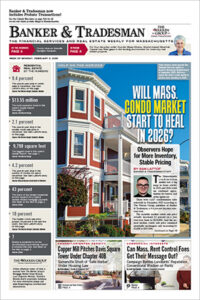
Jonathan Berk
An “abundance” discourse has emerged in the national conversation, and unless you live in a cave, it’s been hard to miss.
Championed by New York Times columnist and podcaster Ezra Klein and Atlantic Magazine writer Derek Thompson, the “abundance” message spelled out in their new book of the same name attributes the growing unaffordability, and overall stasis, in traditionally Democrat-led states to decades of government red tape and bureaucracy, which have created an artificial scarcity in essential areas like housing, transportation and energy.
This should sound familiar if you live in Massachusetts. Despite modest reforms through recent legislation like MBTA Communities, our state continues to be its own worst enemy when it comes to realizing true housing abundance capable of serving the needs of a growing, evolving population.
Strict local zoning regulations, new energy codes, prolonged community processes, inclusionary zoning and other policies, while well-intentioned on their own, taken in the aggregate serve as a maddening barrier to needed housing production.
A Broken Permitting Process
Decades of significant down zoning in Massachusetts resulting in limited “as-of-right” buildable land have led to a lengthy and often adversarial permitting process for nearly all new housing.
A recent study found that 98 percent of Boston’s residential parcels do not conform to current zoning laws. This high level of nonconformity is common across Eastern Massachusetts, affecting everything from small additions to accommodate a growing family to new multifamily developments, forcing most projects into a lengthy, often contentious discretionary review process.
To the development community, the unpredictable threat of lengthy delays and uncertainty can be the death knell for new housing developments. In many Massachusetts communities, local board have used their ability to delay, delay, delay for decades. As a recent Pioneer Institute report points out, “decisions that ought, in planning theory, to be debated in comprehensive planning exercises are instead implicitly delegated to project-by-project debate before citizen boards.”
Although processes like site plan review should be narrowly focused, they frequently lead to aesthetic modifications beyond their intended scope. Developers are forced to comply with these budget-inflating demands to secure approval, increasing their project’s cost. While they could challenge these requests in court after a hard-fought approval, doing so might jeopardize future work opportunities in that town – and their current permit.
While substantial, regionwide, zoning reform to allow more by-right development is essential to our region’s future viability, in the interim, permitting reform is urgently needed. A recent bill filed in the state House of Representatives, H.2298, would seek to define site plan review and place reasonable guardrails on the process, hopefully curtailing some of the runaway project costs and broader uncertainties faced by new housing proposals.
Costly Environmental Regulations
Recently, cities and towns in Massachusetts implemented new energy codes aimed at enhancing energy efficiency in new buildings.
While this is undoubtedly a commendable goal, it significantly raises the costs of many new housing projects, sometimes preventing needed new housing development entirely.
If we continue to deter new housing, particularly in walkable areas near transit, we lose many of the environmental advantages of “car-free” or “car-lite” lifestyles that infill housing development offers and risk encouraging more sprawling greenfield development.
Massachusetts’ recent Unlocking Housing Production Commission report highlights that “while maintaining the state’s commitment to reducing carbon emissions, Massachusetts must also ensure that its energy policies do not unintentionally stifle housing production” and recommends factoring in development cost increases when discussing energy code changes and developing a state level appeals process.
Layers of Regulation
For over 50 years, we’ve implemented regulation after regulation that has gradually hindered housing production in our region. From restrictive dimensional requirements to excessive parking minimums, today’s regulatory environment works against our housing production goals.
A self-imposed scarcity drives prices upward, leading to the introduction of new regulations like inclusionary zoning policies intended to make some units of new housing a bit more affordable.
As highlighted in a recent Pioneer Institute report, “inclusionary zoning helps address urgent, short-term housing needs for a few families, but can also jeopardize long-term, broad-based affordability by discouraging new supply and necessitating increases in market-rate prices to offset monetary losses from income-restricted units.”
This is not a claim that inclusionary zoning is fundamentally negative. Instead, it is a call to acknowledge that the demand for current inclusionary policies primarily arises from decades of accumulated restrictions that have contributed to the current housing shortage. Implementing new restrictions in response to rising prices might provide temporary relief for some, but in conjunction with an already burdensome regulatory environment, it will also extend the ongoing issues of self-imposed housing scarcity.
Between 1960 and 1990, the state approved 900,000 new homes while our population grew by 800,000. From 1990 to 2020, our population increased by over 1 million people, but only about 450,000 homes were permitted.
This growing shortage fuels competition, drives home prices to extreme levels, increases homelessness and threatens the stability of Massachusetts’ families and our economy.
If we fail to acknowledge our role in creating this scarcity, regardless of how well intentioned our motives, we will never establish a regulatory framework that enables us to produce the housing abundance our region needs.
Jonathan Berk is the founder of the real estate and placemaking consultancy re:MAIN and a board member of Abundant Housing Massachusetts.






